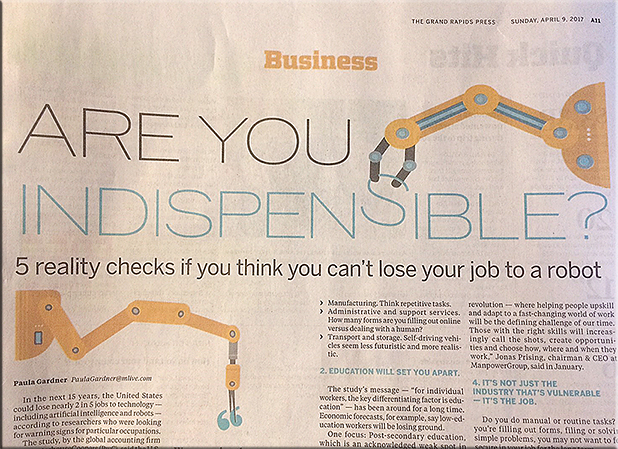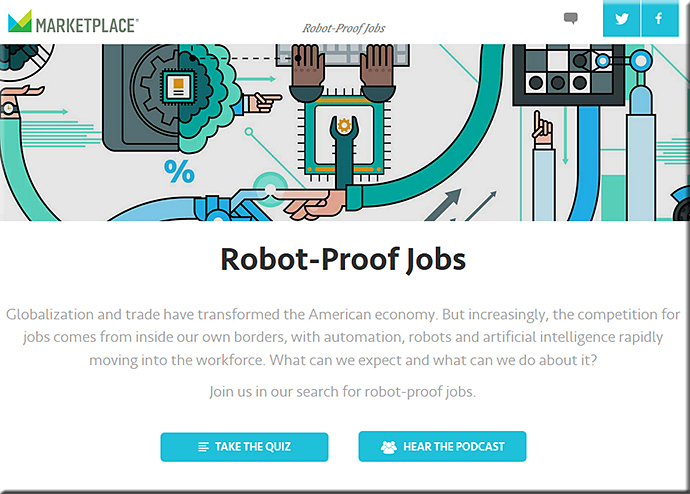From DSC:
The recent pieces below made me once again reflect on the massive changes that are quickly approaching — and in some cases are already here — for a variety of nations throughout the world.
They caused me to reflect on:
- What the potential ramifications for higher education might be regarding these changes that are just starting to take place in the workplace due to artificial intelligence (i.e., the increasing use of algorithms, machine learning, and deep learning, etc.), automation, & robotics?
- The need for people to reinvent themselves quickly throughout their careers (if we can still call them careers)
- How should we, as a nation, prepare for these massive changes so that there isn’t civil unrest due to soaring inequality and unemployment?
As found in the April 9th, 2017 edition of our local newspaper here:

When even our local newspaper is picking up on this trend, you know it is real and has some significance to it.
Then, as I was listening to the radio a day or two after seeing the above article, I heard of another related piece on NPR. NPR is having a journalist travel across the country, trying to identify “robot-safe” jobs. Here’s the feature on this from MarketPlace.org
What changes do institutions of traditional higher education
immediately need to begin planning for? Initiating?
What changes should be planned for and begin to be initiated
in the way(s) that we accredit new programs?
Keywords/ideas that come to my mind:
- Change — to society, to people, to higher ed, to the workplace
- Pace of technological change — no longer linear, but exponential
- Career development
- Staying relevant — as institutions, as individuals in the workplace
- Reinventing ourselves over time — and having to do so quickly
- Adapting, being nimble, willing to innovate — as institutions, as individuals
- Game-changing environment
- Lifelong learning — higher ed needs to put more emphasis on microlearning, heutagogy, and delivering constant/up-to-date streams of content and learning experiences. This could happen via the addition/use of smaller learning hubs, some even makeshift learning hubs that are taking place at locations that these institutions don’t even own…like your local Starbucks.
- If we don’t get this right, there could be major civil unrest as inequality and unemployment soar
- Traditional institutions of higher education have not been nearly as responsive to change as they have needed to be; this opens the door to alternatives. There’s a limited (and closing) window of time left to become more nimble and responsive before these alternatives majorly disrupt the current world of higher education.
Addendum from the corporate world (emphasis DSC):
From The Impact 2017 Conference:
The Role of HR in the Future of Work – A Town Hall
- Josh Bersin, Principal and Founder, Bersin by Deloitte, Deloitte Consulting LLP
- Nicola Vogel, Global Senior HR Director, Danfoss
- Frank Møllerop, Chief Executive Officer, Questback
- David Mallon, Head of Research, Bersin by Deloitte, Deloitte Consulting LLP
Massive changes spurred by new technologies such as artificial intelligence, mobile platforms, sensors and social collaboration have revolutionized the way we live, work and communicate – and the pace is only accelerating. Robots and cognitive technologies are making steady advances, particularly in jobs and tasks that follow set, standardized rules and logic. This reinforces a critical challenge for business and HR leaders—namely, the need to design, source, and manage the future of work.
In this Town Hall, we will discuss the role HR can play in leading the digital transformation that is shaping the future of work in organizations worldwide. We will explore the changes we see taking place in three areas:
- Digital workforce: How can organizations drive new management practices, a culture of innovation and sharing, and a set of talent practices that facilitate a new network-based organization?
- Digital workplace: How can organizations design a working environment that enables productivity; uses modern communication tools (such as Slack, Workplace by Facebook, Microsoft Teams, and many others); and promotes engagement, wellness, and a sense of purpose?
- Digital HR: How can organizations change the HR function itself to operate in a digital way, use digital tools and apps to deliver solutions, and continuously experiment and innovate?









